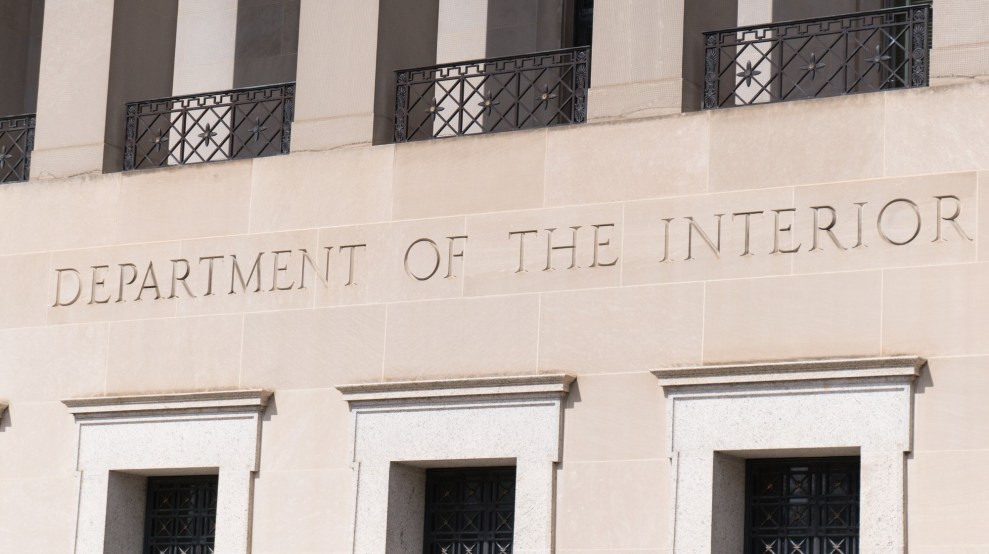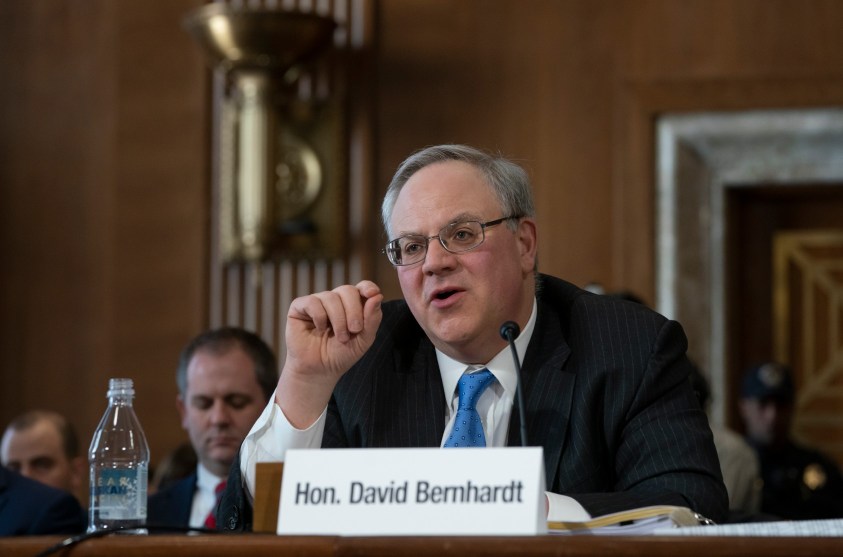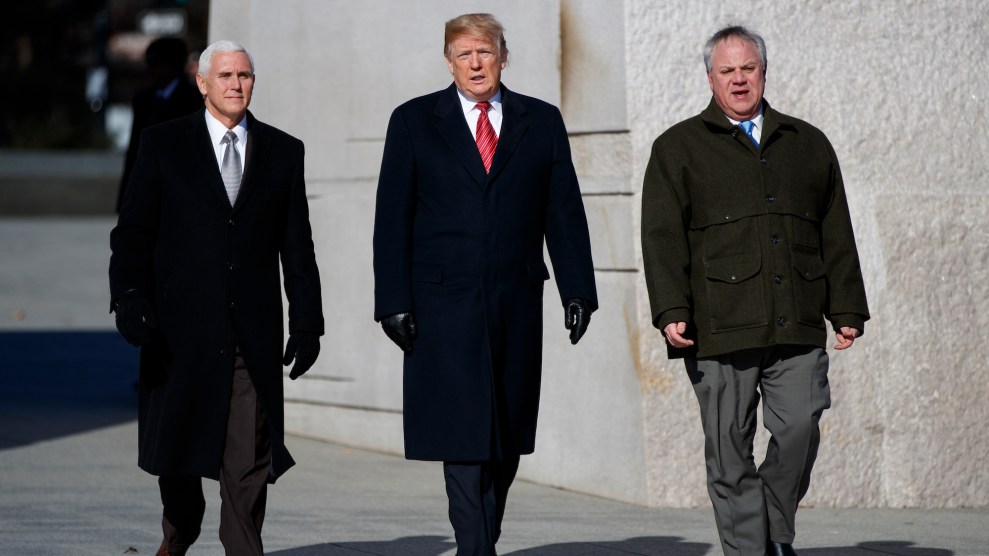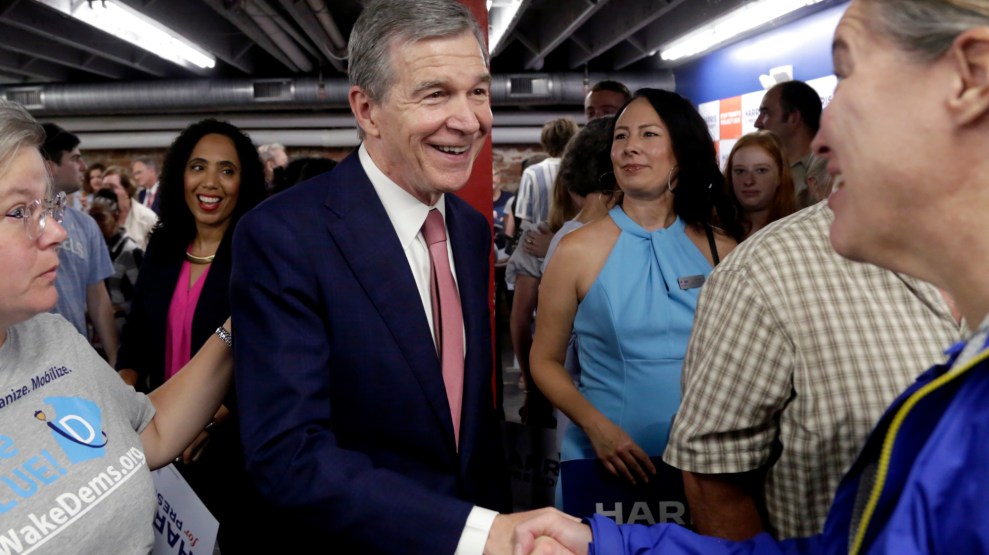
pabradyphoto/Getty
This article originally was published in HuffPost and appears here as part of our Climate Desk Partnership.
In October 2017, Ben Cassidy walked away from his lucrative lobbying gig at the National Rifle Association, where he raked in as much as $288,333 per year, for a post at the Department of the Interior. He’d spent nearly seven years trying to reshape the agency as part of the gun lobby, and despite seemingly clear ethics rules against it, he was soon working on national monuments, sport-hunted animal trophy imports and other issues he’d lobbied on.
In July, less than three months after his conduct became the subject of a formal department ethics probe, Cassidy quietly left his position as the Interior Department’s senior deputy director of intergovernmental and external affairs to join Safari Club International. The Washington, D.C.-based trophy hunting advocacy group has close ties to the Trump administration and is one of several organizations that successfully lobbied the Interior Department to roll back prohibitions on importing lions and elephants killed for sport in certain African countries.
Cassidy is a prime example of the revolving door at President Donald Trump’s Interior Department. A HuffPost review found that at least 11 former officials have landed jobs in industry or lobbying since leaving the federal agency.
Three of them―Cassidy, Vincent DeVito and Todd Wynn―departed not long after getting wrapped up in a formal investigation by the agency’s Office of Inspector General. That probe targets six current and former officials who maintained close ties to former employers, and stems from a complaint the D.C.-based nonprofit Campaign Legal Center filed with the Interior Department’s internal watchdog that cites HuffPost’s reporting and alleges a “disturbing pattern of misconduct” across the agency.
Trump campaigned on a promise to “drain the swamp” of lobbyists in Washington and signed an executive order shortly after taking office that requires all political appointees in the executive branch to sign an ethics pledge. Along with barring former lobbyists from participating in matters on which they lobbied, it includes post-employment restrictions that prohibit political appointees from lobbying their former agencies for five years after leaving government service. Federal ethics rules also include a so-called “cooling off” period preventing senior executive branch officials from lobbying their former agencies for one year.
Trump’s ethics pledge is not as clear as it may seem. Virginia Canter, chief ethics counsel at the Washington-based government watchdog Citizens for Responsibility and Ethics, or CREW, says there’s a “big loophole” that allows lobbying on “rulemaking” ― the very thing that agencies like Interior Department do and that groups like Safari Club want to influence.
The language, Canter said, “completely takes the teeth out of” employment restrictions for recent government employees. More than 30 former Trump officials have managed to skirt the pledge’s lobbying prohibitions using this and other loopholes, according to a February report by ProPublica.
“If you can imagine a target, this thing is shot full of holes,” Canter said of the administration’s pledge.
Delaney Marsco, ethics counsel at the Campaign Legal Center, told HuffPost that even if these officials aren’t breaking those rules, their activity is “emblematic of the bigger revolving door problem in Washington,” in which industry insiders serve short stints in government, only to return to work for the companies they previously regulated.
“The conduct of these Interior officials, both in office and after, raises serious questions about whether those officials used their time in government to serve the public’s interests or the interests of the wealthy, influential industry groups who could line their pockets,” she said.
Here are some of the key officials who have dashed through the revolving door at Trump’s Interior Department:
Ryan Zinke
From his first day on the job, the 52nd Interior Department chief touted himself a public land champion and conservationist in the mold of President Theodore Roosevelt. But in his 21 months at the department’s helm, Zinke was a magnet for scandal and a champion of Trump’s pro-industry agenda, weakening environmental protections and opening millions of acres of federal land to extraction.
Zinke stepped down in January under a darkening cloud of ethical troubles. Within two weeks of his resignation, the former Montana congressman and Navy SEAL landed a job as senior vice president of Artillery One, a little-known blockchain investment firm. Weeks after that, he and former Trump campaign manager Corey Lewandowski joined lobbying firm Turnberry Solutions as senior advisers. And in April, mining exploration company U.S. Gold Corp. announced Zinke as a new member of its board of directors. In a press statement at the time, Zinke said he was “excited” to “help make mining great again in America.”
Zinke was replaced by David Bernhardt, a former fossil fuel and agricultural lobbyist whom critics have described as the “ultimate D.C. swamp creature” and whose former clients have enjoyed seemingly unfettered access to Trump’s Interior Department.
Ben Cassidy
As Safari Club’s new director of government affairs, Cassidy oversees its government relations, legal advocacy and international affairs departments. The Safari Club spent $180,000 lobbying Congress and the Interior Department in the first three quarters of 2019. It is unclear what involvement Cassidy has had in the group’s lobbying efforts in recent months. Safari Club did not respond to HuffPost’s request for comment.
Along with participating in Interior Department meetings dealing with issues he worked on during his NRA lobbying days, Cassidy played a sizable role in getting the department’s controversial hunting advisory council off the ground.
Zinke created the so-called International Wildlife Conservation Council in 2017 and loaded it with gun and trophy hunting advocates, including one of Cassidy’s former colleagues at the NRA and several people currently or previously affiliated with Safari Club. Documents show that Cassidy was the point person for council members when they traveled to Washington, D.C., for two private receptions in March 2017, raising red flags for ethics experts, as HuffPost first reported.
Safari Club’s political action committees donated $11,000 to Trump’s 2016 presidential campaign, as well as a total of $13,500 to Zinke’s 2014 and 2016 congressional bids. When the Trump administration reversed an Obama-era ban on the importation of elephant trophies from Zimbabwe and Zambia in November 2017, the news was made public not by a federal agency but in a press release from the Safari Club. The group has cheered the Trump administration’s policy actions at nearly every turn. Its sister organization, Safari Club International Foundation, is a former client of current Interior Secretary Bernhardt’s.
Downey Magallanes
A top aide of former Interior Secretary Ryan Zinke, Downey Magallanes oversaw the administration’s controversial review of national monument designations, as HuffPost previously reported, which ultimately opened large swaths of formerly protected sites in Utah to mining, drilling and other development.
Magallanes left the Interior Department in August 2018 for a senior government affairs job at oil giant BP, a company she met with at least five times during her tenure at the federal agency, The Washington Post reported.
Magallanes is the daughter of Frederick Palmer, a former executive with coal giant Peabody Energy and an outspoken climate change denier. Palmer previously told HuffPost that Magallanes had recused herself from matters relating to Peabody, but Interior Department schedules show that she and other agency officials met with senior representatives of the company in June 2017, roughly a month after she and Zinke toured coal-rich Grand Staircase-Escalante National Monument. That same month, she advised a Peabody executive on the best contact at the Interior Department to help the coal company get a mine modification approved, internal emails show.
Zinke maintained that the monument rollbacks were not aimed at boosting energy or mineral extraction, but in his final monument report to the White House, he acknowledged the potential for fossil fuel extraction in Grand Staircase-Escalante, noting that the site contains “an estimated several billion tons of coal.” And a Bureau of Land Management mapping specialist told investigators at the Interior Department’s Office of Inspector General that he was ordered to redraw the Grand Staircase-Escalante boundary to exclude areas rich in coal, according to testimony that Rep. Jared Huffman (D-Calif.) cited at a March congressional hearing.
Joe Balash
During his nearly two-year tenure as the Interior Department’s assistant secretary for land and minerals management, Joe Balash relentlessly pushed policies that primarily benefited the fossil fuel industry.
Among other things, Balash helped lead the department’s effort to promote new oil exploration and drilling in the Atlantic Ocean. He oversaw huge oil and gas lease sales on Bureau of Land Management parcels across the nation. And he played a central role in the Trump administration’s attempt to open the Arctic National Wildlife Refuge and other protected Alaskan lands to new fossil fuel extraction.
While still working at Interior, Balash met or communicated on several separate occasions with Oil Search officials, according to his official calendar. Balash’s move through the revolving door raised suspicions on Capitol Hill. In September, Sen. Tom Udall (D-N.M.) sent a letter to Interior Department ethics officials in an effort to probe whether Assistant Secretary Balash had complied with federal conflict of interest laws in his interactions and communications with Oil Search.
As a senior counselor to then-Secretary Zinke during the early years of the Trump administration, Vincent DeVito was another steadfast ally of the energy industry. Over the course of his tenure, DeVito helped lead an industry-friendly advisory committee that sought to lower royalty rates for offshore oil and gas drillers. He was personally involved in an effort to ease Endangered Species Act restrictions on coal mines in West Virginia. And public records show that he appears to have played a direct role in delaying endangered species protections for an imperiled freshwater mussel in Texas at the behest of oil and gas interests.
DeVito, a longtime corporate lawyer who co-chaired Trump’s 2016 presidential campaign in Massachusetts, stepped down from the Interior Department in August 2018. A few weeks later, he took a job with Cox Oil Offshore LLC, a Dallas-based fossil fuel firm that has significant holdings on the outer continental shelf, which the Interior Department oversees.
The company’s CEO, Brian Cox, said in a statement that DeVito would help his firm with expansion plans. “As we continue to expand our market position within the Gulf of Mexico, it is imperative that Cox Oil have strong legal counsel with a comprehensive knowledge of public policy and experience working with global private and publicly-held companies,” he said at the time. “Mr. DeVito will help guide us through this next phase of growth.”
At least six other top appointees at Trump’s Interior Department have stepped away from the agency to take jobs with fossil fuel interests, lobbying firms or other private companies. They include former Acting Deputy Chief of Staff Megan Bloomgren, who left office in June 2017 and became a vice president at the American Petroleum Institute, the nation’s largest oil and gas trade group.
Todd Wynn, who led the Interior Department’s Office of Intergovernmental and External Affairs for roughly two years, also recently exited through the revolving door. Wynn departed the Interior Department in late August 2019, not long after federal investigators began probing allegations that he violated federal ethics rules while in office. He is now a government affairs representative at Arizona Public Service, the largest electric utility in Arizona.
And there’s Jason Larrabee, who served as the Interior Department’s principal deputy assistant secretary for fish and wildlife and parks for approximately seven months beginning in 2017. He left the department in spring 2018 to become a senior policy adviser at Van Ness Feldman, a powerhouse lobbying firm whose clients include corporate opponents of the Endangered Species Act ― another target of Trump’s deregulatory agenda.
Rep. Raúl Grijalva (D-Ariz.), chairman of the House Natural Resources Committee, said the Trump administration “treats public service as nothing more than a qualification for selling connections and cashing in on influence.”
“Many of the people who serve Trump truly believe that what’s good for oil, gas and coal companies is inherently good for the country,” he said in an emailed statement. “This is the leadership you can expect when you stock your Interior Department with climate deniers and polluter lobbyists who can’t wait to sell out our environment.”
Interior Department spokesperson Melissa Brown told HuffPost via email that all Interior political appointees must comply with ethics rules, including post-employment restrictions, and said the former officials HuffPost inquired about had all sought guidance from agency ethics officials before leaving the department.
















